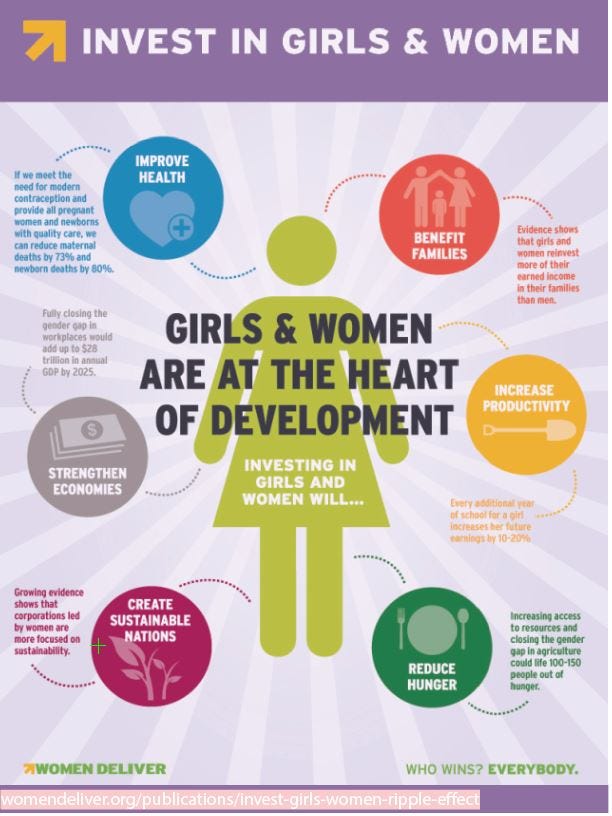Investing in Women: A Pathway to Progress and Equality
Written on
Chapter 1: The Importance of Women's Empowerment
Empowering women is vital for cultivating a forward-thinking society, as it encourages advancements in social, political, and economic spheres. Countries in Asia, particularly Singapore and China, have successfully empowered their female populations, achieving global recognition as leading examples of success and status. By offering a range of opportunities to women, societies can enhance their lives and encourage active participation in both social and political arenas.
International Women's Day (IWD), celebrated each year on March 8th, serves to highlight the struggles and achievements of women worldwide. This day is dedicated to acknowledging the critical roles women play within societies and advocating for their rights. The theme for this year's IWD is 'Invest in Women: Accelerate Progress'. Investing in women is a potent strategy for uplifting individuals, communities, and nations, with Pakistan being a notable example.
Pakistan stands at a pivotal moment where leveraging women's capabilities could lead to significant advancements in economic development and social improvement. Recognizing the essential role of investing in Pakistani women is crucial for the nation's growth.
This paragraph will result in an indented block of text, typically used for quoting other text.
Section 1.1: Barriers to Women's Participation
Women in Pakistan, similar to many other nations, face challenges that hinder their full societal engagement, including limited access to education and healthcare, as well as systemic inequities in the workforce and decision-making processes. Nevertheless, prioritizing investments in empowering initiatives can not only foster gender equality but also unlock immense potential for economic and social growth. When given equal opportunities, women can become agents of transformative change, driving innovation, building inclusive communities, and promoting sustainable development across various sectors.
Subsection 1.1.1: Economic Impact of Women's Empowerment

Empowering women through job opportunities, training, and financial resources can unlock their potential to contribute to the nation’s economic development. Research has shown that full female participation in the economy leads to increased productivity, elevated GDP, and poverty alleviation. In Pakistan, initiatives such as microfinance programs, vocational training centers, and entrepreneurship schemes aimed at women have shown positive results in bolstering women's economic empowerment. Programs like the Kamyab Jawan initiative, Pink Bus Service, and the National Financial Inclusion Strategy (NFIS) reflect a commitment to supporting female entrepreneurship through financial assistance and training for young businesswomen. A report by the International Growth Centre (IGC) released in March 2023 indicates that achieving gender equality in the labor market could potentially increase Pakistan's GDP by about 60% by 2025.
Section 1.2: Education and Skills Development
Investing in girls' education and skills development is essential for creating a skilled workforce that ensures the long-term competitiveness of the country. Despite recent progress, Pakistan continues to face significant hurdles in achieving gender equality in education, particularly in rural areas and among marginalized groups. According to the Pakistan Education Statistics report for 2019-2020, the net enrollment rate for girls in primary schools is 77.1%, compared to 81.3% for boys.
By investing in girls' education through scholarships, infrastructure improvements, and teacher training programs, Pakistan can unlock the potential of many young women. Enhancing human capital also entails investing in vocational training centers and aligning skill development with market demands. Recently, there has been a rise in private training institutions catering to women in urban and rural areas, offering short courses in fields like graphic design, fashion, and IT. Educated and skilled women are more likely to enter the workforce and make informed decisions regarding their health, families, and communities.
Chapter 2: Promoting Political Participation
Encouraging women to participate in politics and leadership roles is vital for fostering inclusive governance and decision-making processes. Although Pakistan has made strides in increasing women's representation in parliament and local governance, significant cultural and systemic barriers remain. Recent statistics from the Inter-Parliamentary Union reveal that women hold only 20.7% of seats in Pakistan's National Assembly.
Supporting women's political leadership requires providing training, mentorship, and support systems to help them navigate the political landscape and combat gender-based discrimination. Including women in decision-making roles brings diverse perspectives and solutions to societal challenges, leading to more effective and inclusive policies.
Section 2.1: Health and Wellbeing
Improving women's access to reproductive rights and healthcare services is essential for enhancing their wellbeing and health. Investments in maternal and child health, family planning, and gender-sensitive healthcare infrastructure can lead to reduced maternal mortality rates, improved child nutrition, and empowered women who can make informed choices about their bodies and futures. Government initiatives such as the Sehat Sahulat and ES-Mother programs aim to increase healthcare access for women and underprivileged groups by providing health insurance coverage to low-income families.
Investing in women is not merely an issue of social equity; it is a strategic necessity for Pakistan's growth and prosperity. By empowering women economically, politically, and socially, Pakistan can harness their potential as catalysts for development. Numerous Pakistani women are leading the charge for women's rights and equality, facing challenges head-on. Activists, educators, journalists, and politicians are committed to dismantling gender stereotypes and promoting women's empowerment. By investing in women, Pakistan can pave the way for a more equitable, inclusive, and sustainable future for upcoming generations. The observance of IWD serves as a powerful reminder of the progress made and the ongoing efforts required to achieve gender equality. It is imperative to continue advocating for women's rights and dismantling the obstacles that hinder the establishment of a fair and equal society.